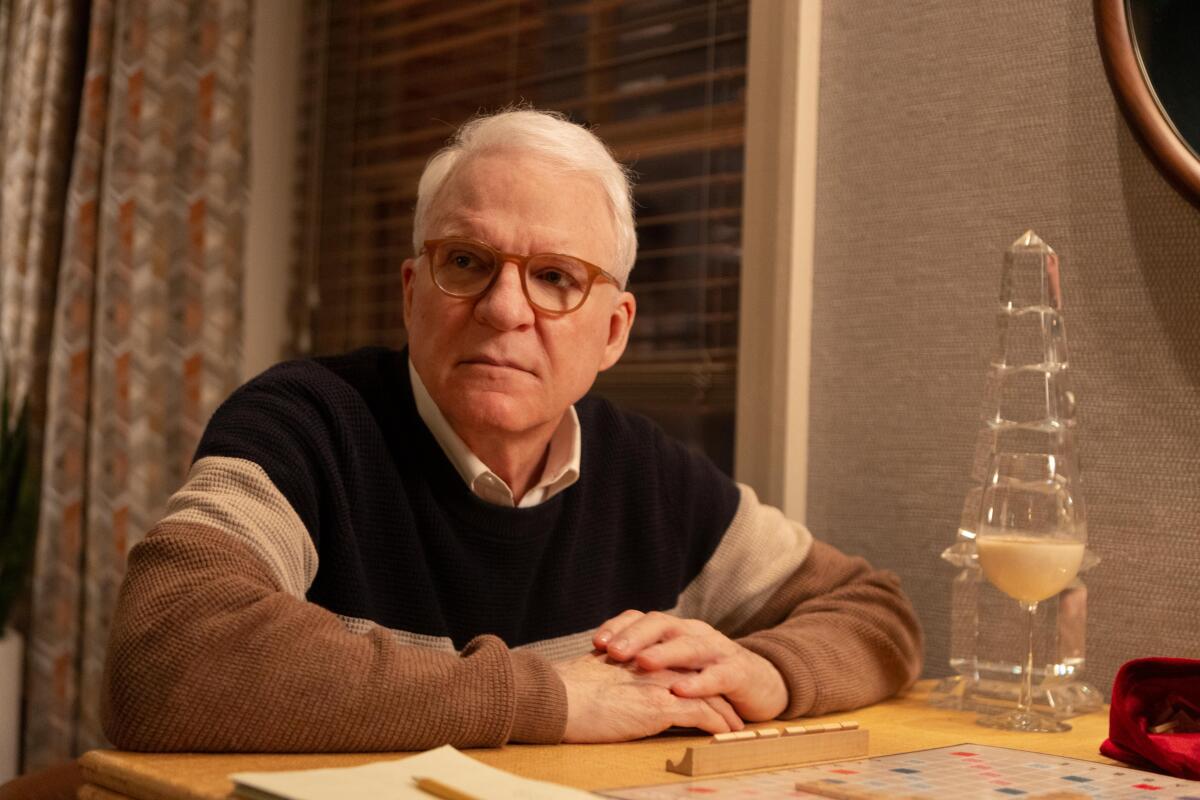That nearly silent ‘Only Murders’ episode? We break it down

- Share via
When showrunner John Hoffman mapped out the 10 episodes that would constitute the first season of the Manhattan-set “Only Murders in the Building,” he decided to build each installment around the perspective of a different character. An ambitious notion, certainly, but that was only the beginning of Hoffman’s audacity.
“It became very exciting to imagine, ‘Oh, we can come from Teddy’s son’s P.O.V.,’” he says by phone from his New York apartment. “‘What if we made an entirely dialogue-free episode?’”
Teddy, played with oily charm by Nathan Lane, is one of the show’s potential murderers, a subject of scrutiny for Charles (Steve Martin), Oliver (Martin Short) and Mabel (Selena Gomez), residents of the Arconia who have launched a true-crime podcast to investigate who killed their neighbor Tim.
However, to focus the series’ seventh episode, “The Boy From 6B,” on Teddy’s son Theo (James Caverly) would be challenging considering the character is deaf. But as Cherien Dabis, who directed the episode, recalls, “They pitched me doing a silent episode of television, and I thought, ‘If I wasn’t in before, I’m definitely in now.’”
“The Boy From 6B” reveals Theo’s heartbreaking backstory and the dark secret he and his father have kept hidden for years, but on a technical level, it required some unconventional storytelling. In all of Theo’s scenes, there’s almost no audible sound — just a slightly muffled ambient noise — while in the other scenes, the hearing characters don’t speak. Hoffman was insistent that the episode avoid gimmicks, but his first real test came when he presented the script to his partners at Hulu and 20th Century.
“They read the script and there was dialogue, but it was all ASL [American Sign Language] with subtitles,” Hoffman says. “There was a very gentle conversation creatively with the executives: ‘But we’re still going to hear that dialogue, right?’ I said, ‘No, the audience will need to be paying attention and looking at the television screen. I know that’s a radical thought — right now, everyone’s multitasking on phones — but that is the leap I’m hoping you’re willing to take.’”
Eventually, the executives acquiesced, although Hoffman acknowledges that even some in the cast “were very dubious.” But perhaps most concerned was Caverly, a Deaf performer who had moved to New York shortly before the pandemic. Through an interpreter, Caverly says that when he learned about the episode’s conceit, “I was completely terrified. Of course the acting, that’s one part of it, but [also] how can I make sure that this representation is authentic enough?’”

“James said to me, ‘How is the Deaf community going to know that we’re in Theo’s point of view versus the hearing world?’” recalls Dabis. “It was a really amazing question. I decided I wanted Theo’s point of view to feel a lot more subjective and intimate. We shot wide-angle close-ups on him, so that we really were with him emotionally and we would feel his distress.”
Meanwhile, Hoffman and episode writers Stephen Markley and Ben Philippe worked to ensure that Oliver and Mabel, who do some clandestine sleuthing, and Charles and potential love interest Jan (Amy Ryan), who are on their first date, were placed in believable dialogue-free scenarios. But that still meant losing one of the series’ principal pleasures, which is its rich banter.
“I had to give them the freedom to speak on some takes,” Dabis says. “It was a process. I think sometimes the silence [in the script] was [taken] literally — people felt like they couldn’t make any sound. So I let the actors know, ‘You can make sound — there’s just no dialogue.’”
Martin and Ryan’s silent rapport allowed for some saucy flirtation when their characters play Scrabble, the words they put down on the board — including “wet” and “hard” — sparking sexual attraction between them. “Steve Martin tends to write me one-sentence emails on a daily basis with ideas — it’s the greatest thing about this job,” Hoffman says. “He wrote me a list of potential Scrabble words for this sexy game — each one made me laugh harder, and he would write them in one email, one word at a time.”
Meanwhile, Lane, who didn’t know ASL, had about six weeks to become competent for his wrenching scenes with Caverly. “I was just learning the dialogue for [my] scenes,” the three-time Tony winner says. “It’s such a beautiful language, and when you see someone do it really well, it’s very intimidating because you wish you had the time to learn. To become fluent in American Sign Language would take at least six months to a year, really.”
As for replicating Theo’s deafness, Hoffman tapped sound designer Mathew Waters, who won multiple Emmys for “Game of Thrones.” “They recorded sound on the set,” Waters says, “so I told them, ‘Hey, send me the cut with the actual sound in it.’ And then I distorted the actual sound. It creates this feeling of being underwater.”
At the same time, Waters (whose father taught sign language) wanted the soundscape to subtly suggest Theo’s psychological state of mind. “When I’m designing, I’m doing it [from] the perspective of emotion,” he says. “‘How is this making me feel?’ So my last layer I created were these low-end womps when Theo gets super-agitated. Every now and then, they come in and just take over for a second and almost kind of throw you. It’s almost musical.”
“It’s very important to have community and develop a Deaf identity... And what we learn about Theo is that he doesn’t have that community — he only has his relationship with his father.”
— James Caverly
In “The Boy From 6B,” we see through flashbacks how Theo’s infatuation with the beautiful Zoe (Olivia Reis) leads to tragedy. The episode belongs to Caverly, who brings a vulnerability that underscores how this lonely character once got close to making a connection with someone, only to have it slip through his fingers.
For Caverly, the episode is a microcosm of the struggles some Deaf people face. “It’s very important to have community and develop a Deaf identity,” Caverly says. “And what we learn about Theo is that he doesn’t have that community — he only has his relationship with his father.”
Despite the risks involved, Hoffman couldn’t be happier with “The Boy From 6B,” its mixture of craftsmanship and tonal nuance superbly executed. Now that he’s completed Season 2, should we expect more high-concept episodes?
“We did think, ‘How do we top ourselves?’ But you have to be careful,” Hoffman notes. “There are ways in which we have set up our [new] season that allow for new leaps, but they couldn’t be gimmicky. They had to be organic.”
More to Read
From the Oscars to the Emmys.
Get the Envelope newsletter for exclusive awards season coverage, behind-the-scenes stories from the Envelope podcast and columnist Glenn Whipp’s must-read analysis.
You may occasionally receive promotional content from the Los Angeles Times.










